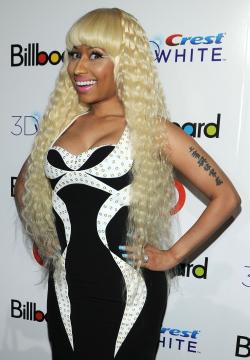Nicki Minaj—the female pop-rapper known for her stuttering lyrics and wonkified fashion taste—is something of a controversial figure in the contemporary musical landscape. Some listeners revel in her playful, off-kilter style, while others find it as grating as when a video gets out of sync with its audio track. Certain, however, is the fact that Minaj’s star continues to rise: she’s been tapped to accompany Madonna in this weekend’s Superbowl halftime show, and her second proper album, Pink Friday: Roman Reloaded, will be released later this year.
Minaj is clearly a hot property, so it may come as a surprise that the BET network has reportedly banned the video for her song “Stupid Hoe” for being too explicit for television. But what counts as crossing the line on a network that regularly shows videos featuring nearly nude women gyrating to often objectifying and at times even degrading lyrics? Watching the video, I can’t help but wonder which element is being deemed beyond the pale (and BET isn’t telling yet). Sure, we see essentially bare butts a fair amount, and Minaj performs (rather ironically, in my opinion) the sexualized choreography required of female entertainers, but my more delicate moral sensibilities are definitely not offended. In fact, it’s the seizure-inducing quality of the editing that’s really troubling.
But what of the lyrics? While no one is suggesting that “hoe” is a nice word to use in reference to women, it’s certainly common currency in genres like rap and hip-hop. And here, Minaj deploys the put-down in classic “diss” song fashion, using it to call out her female enemies—it’s a symbolic filler more than anything else. Still, BET could censor the word along with the song’s other no-nos (making it even more fantastically choppy!), but that seems overkill. And in any case, if the network has decided it’s in the business of policing sexism or explicit sexuality in its content, then censors have a ton of other cleaning up to do on male-authored tracks.
Of course, one could regret the same-sex misogyny of the thing; Slate’s Jonah Weiner did that during his participation in the magazine’s 2011 Music Club coverage:
…the single is a flashback to the tedious, dispiriting beef that began between Lil Kim and Nicki Minaj when the latter’s star was first on the rise. Women have it tough enough in hip-hop without mean-girling each other. I wish Kim had looked upon Minaj, who owes her an inarguable debt, not with spite but rather, as Missy Elliott did, with pride and excitement. And I wish Nicki Minaj (who may be trying to communicate some hardness herself after her love-song-stuffed debut album) didn’t find it necessary to perpetuate the violence.
But girl-on-girl aggression is not the issue here. If male rappers are celebrated (or at least tolerated) for presenting women as hyper-sexualized playthings, then female artists should certainly be allowed to paint the self-portrait of their choice. Perhaps Minaj’s ridiculous (even satirical?), blunt exaggeration of sexist themes (e.g. caged feline, baby doll, mannequin) makes BET executives uncomfortable. But then, double standards are always awkward.
Watch the (possibly NSFW) video below and then let us know what you think: Is BET’s ban the result of sexism or prudence?
